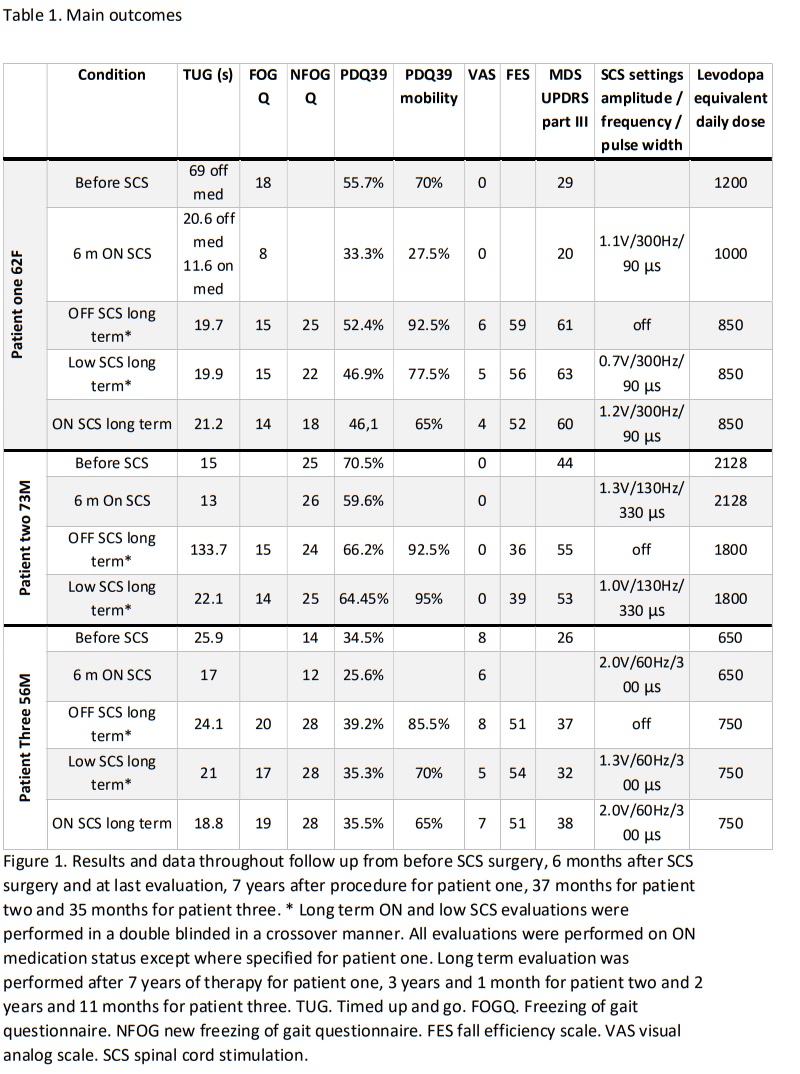Category: Surgical Therapy: Parkinson's Disease
Objective: In the present study we set out to report a very long-term follow-up period of spinal cord stimulation (SCS) for Parkinson’s Disease (PD) patients previously treated with deep brain stimulation (DBS) as well as reduce bias through a double blinded, placebo-controlled crossover evaluation incorporating sub threshold stimulation with a later comparison to standard supra threshold amplitude.
Background: SCS for PD is an emerging therapy with promising reports on various advanced PD symptoms from locomotion problems to bradykinesia and tremor, but evidence quality is limited by the scarcity of placebo-controlled trials and lack of long-term reports.
Method: This study selected patients chronically implanted with DBS subjected to SCS surgery at T2-T4 levels for refractory gait disorder with follow up period longer than two years, and evaluated gait, quality of life, freezing of gait and balance through a double blinded, placebo-controlled crossover evaluation and comparison of the results to available data before surgery and early 6 months follow up.
Results: Results are summarized in table 1.
Three patients were selected with follow ups of 2 years and 11 months, three years and seven years. Only the patient with longest follow up reported subjective satisfaction from SCS therapy.
Long term comparison showed overall 9% superior quality of life scores to baseline scores, with a 23% worsening however when comparing to 6 months after surgery. Timed up ang go times which had previously 70.1%, 13% and 35,4% improvements comparing 6 months of SCS and baseline, had respectively 1% worsening, 83% and 13% improvement when comparing off and subthreshold stimulation in a double blinded manner. No consistent SCS effect in fall efficacy or freezing of gait questionnaires nor in rigidity, tremor or bradykinesia were documented.
Comparison of subthreshold to suprathreshold amplitudes was performed in only two patients and showed consistent findings in all evaluations.
Conclusion: We demonstrated consistent findings between subthreshold and suprathreshold stimulation, however when the mixed response in gait and quality of life tests under placebo evaluation and negative findings in all other evaluations limit generalizations regarding SCS efficacy.
These results encourage future further larger and well-designed placebo-controlled trials, sorely lacking for establishing or refuting SCS as a viable therapy in PD.
References: 1. Cai Y, Reddy RD, Varshney V, Chakravarthy KV. Spinal cord stimulation in Parkinson’s disease: a review of the preclinical and clinical data and future prospects. Bioelectron Med. 2020 Mar 16;6:5. doi: 10.1186/s42234-020-00041-9. PMID: 32232113; PMCID: PMC7098258.
2. Thevathasan W, Mazzone P, Jha A, Djamshidian A, Dileone M, Di Lazzaro V, Brown P. Spinal cord stimulation failed to relieve akinesia or restore locomotion in Parkinson disease. Neurology. 2010 Apr 20;74(16):1325-7. doi: 10.1212/WNL.0b013e3181d9ed58. PMID: 20404313; PMCID: PMC2860483.
3. Prasad S, Aguirre-Padilla DH, Poon YY, Kalsi-Ryan S, Lozano AM, Fasano A. Spinal Cord Stimulation for Very Advanced Parkinson’s Disease: A 1-Year Prospective Trial. Mov Disord. 2020 Jun;35(6):1082-1083. doi: 10.1002/mds.28065. Epub 2020 Apr 20. PMID: 32311155.
4. Pinto de Souza C, Hamani C, Oliveira Souza C, Lopez Contreras WO, Dos Santos Ghilardi MG, Cury RG, Reis Barbosa E, Jacobsen Teixeira M, Talamoni Fonoff E. Spinal cord stimulation improves gait in patients with Parkinson’s disease previously treated with deep brain stimulation. Mov Disord. 2017 Feb;32(2):278-282. doi: 10.1002/mds.26850. Epub 2016 Nov 10. PMID: 27862267.
5. Cury RG, Carra RB, Capato TTC, Teixeira MJ, Barbosa ER. Spinal Cord Stimulation for Parkinson’s Disease: Dynamic Habituation as a Mechanism of Failure? Mov Disord. 2020 Oct;35(10):1882-1883. doi: 10.1002/mds.28271. PMID: 33068473.
To cite this abstract in AMA style:
R. Carra, J. Menezes, T. Capato, K. Duarte, R. Cury. Spinal cord stimulation for gait problems in Parkinson´s disease: Long term report and placebo viability [abstract]. Mov Disord. 2022; 37 (suppl 2). https://www.mdsabstracts.org/abstract/spinal-cord-stimulation-for-gait-problems-in-parkinsons-disease-long-term-report-and-placebo-viability/. Accessed December 30, 2025.« Back to 2022 International Congress
MDS Abstracts - https://www.mdsabstracts.org/abstract/spinal-cord-stimulation-for-gait-problems-in-parkinsons-disease-long-term-report-and-placebo-viability/

